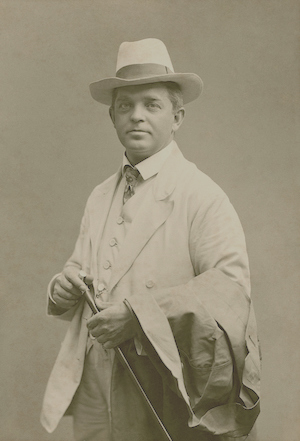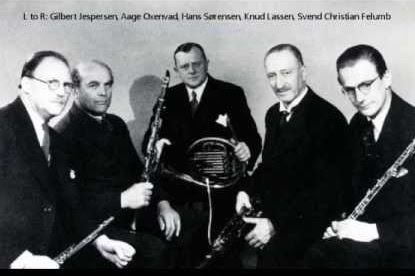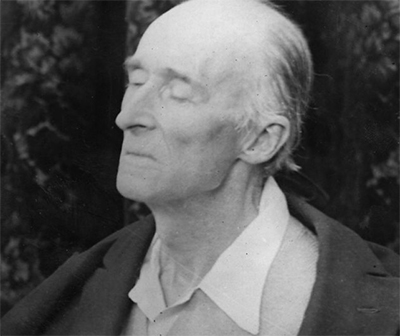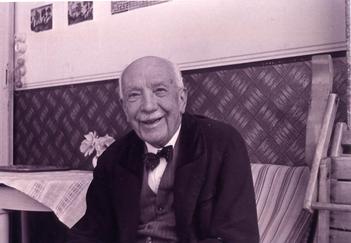By Daniel Hathaway

. Summer seasons launch and continue
. Zimmerman enters Hospice care, R.I.P. pianist George Winston
. Almanac remembers Carl Nielsen and the Copenhagen Wind Quintet, Frederick Delius, George Frederick McKay & Théodore Dubois.
HAPPENING THIS WEEKEND:
These three days offer the continuation of a summer series sponsored by Apollo’s Fire, and summer festivals presented by Re:Sound, ENCORE, and Ohio Light Opera (pictured). Visit our Concert Listings page for robust listings of these and other events — composer names, composition titles, and performers.
Apollo’s Fire’s The Fiddlers of Dublin, created & directed by Jeannette Sorrell, plays at Holden Arboretum on June 9, 10 & 11 (four shows).
The Re:Sound New and Experimental Music Festival has scheduled seven events that run the gamut from A to Z (Alternative to Zany). Performances are at Convivium 33 Gallery unless otherwise noted: John Wiese // Brandon Lopez (Friday, June 9), Laura Potter + Ina McCormack // Douglas Farrand + Ryan Seward), AK Ensemble and guest Brandon Lopez (Saturday, June 10), Terminal Moraine // Kim Nucci // Emily Beisel (Saturday, June 10 at Crobar), and SLOWSPIN // Theresa May (Sunday, June 11).
ENCORE Chamber Music Institute will launch three of its summer events this weekend. On Friday, June 9, “Director’s Carte Blanche” will feature artistic director Jinjoo Cho and her Toy Store in J.S. Bach’s Violin Partita No. 2 in d and Juri Seo’s Toy Store for Violin and Fixed Media Electronics (2022) at Shafran Planetarium at the Cleveland Museum of Natural History.
On Saturday, June 10, ENCORE will present the Cavani String Quartet (Annie Fullard and Catherine Cosbey, violins, Eric Wong viola, and Kyle Price, cello) with poet Mwatabu Okantah in “Enchantment” at the Akron-Summit County Public Library.
And on Sunday afternoon, ENCORE’s Artist-Teacher Showcase, “Serenity,” will present Brendan Shea, Jinjoo Cho, and Paul Kantor, violins, Eric Wong and Ivo Jan van der Werff, violas, Kyle Price and Maxwell Geissler, cellos, Mark Eichenberger, percussion, and Hyunsoo Kim and Tina Dahl, pianists, in Juri Seo’s TLC, Arvo Part’s Spiegel im Spiegel, Lu Yun’s Temples in Taiwan, and Robert Schumann’s Piano Quintet in Harkness Chapel at Case.
And on Saturday evening at 7:30, Ohio Light Opera will raise the curtain on the opening show of its 44th season. Camelot (pictured above), with book and lyrics by Alan Jay Lerner, based on the novel The Once and Future King by T. H. White, with music by Frederick Loewe conducted by Michael Borowitz, and directed by Steven A. Daigle, will be presented in Freedlander Theatre at The College of Wooster.
NEWS BRIEFS:
Gerhardt Zimmerman, music director of the Canton Symphony issued a statement on Friday informing his musicians (and by extension, the general public) that he has entered hospice care. Click here to read his message.
George Winston, 73
“George Winston, a pianist whose successful recordings made him one of the first stars of new age music, died June 4 in California after a decades long struggle with cancer.” Read the NPR story here.
WEEKEND ALMANAC:
June 9, by Jarrett Hoffman

Another composer to toss into that group is Carl Nielsen (left), born on this date in 1865, whose well-known Quintet was influenced by the individual members of the Copenhagen Wind Quintet (below). Having overheard the group rehearsing one evening, Nielsen noted how each player’s personality came through in their playing, and decided to portray them in music, particularly in a variations movement.
Variation 5, a duet between clarinet and bassoon, is especially colorful in depicting the hot temper of clarinetist Aage Oxenvad. According to an article by the group’s oboist, Sven Christian Felumb, Nielsen’s instructions here were to “play like a married couple who are arguing…”
Now picture that argument as the kind that goes on and on…and on…about something ridiculously petty. Here in Variation 5, where the bassoon grows quiet at the end, we can imagine that the original Copenhagen player, Knud Lassen, is the person who thankfully just decides to let things go, sparing everyone else in the room. Indeed, Felumb describes Lassen in that article as easygoing and sophisticated — qualities that come across in the bassoon melody that opens the first movement.
Variation 5 is queued up here in a live performance by the Berlin Philharmonic Wind Quintet.

If I could live my life again, I would chase any thoughts of Art out of my head and be apprenticed to a merchant or pursue some other useful trade the results of which could be visible in the end … What use is it to me that the whole world acknowledges me, but hurries away and leaves me alone with my wares until everything breaks down and I discover to my disgrace that I have lived as a foolish dreamer and believed that the more I worked and exerted myself in my art, the better position I would achieve. No, it is no enviable fate to be an artist.
Maybe it would have been comforting to Nielsen to know that the Copenhagen Quintet gathered at his funeral, paying tribute to him with a performance of the beautiful chorale from the last movement of the Wind Quintet.
Read more about that work and that ensemble in Chapter IV of a doctoral dissertation by Marcia L. Spence.
June 10, by Mike Telin

At the time, little did I know that The Paradise Garden was actually a Pub. Unlike many composers whose music I was initially taken by, my feelings for Delius have never waned. Click here to listen to a performance by the London Symphony Orchestra under the direction of Sir John Barbirolli.
Born in Bradford, England on January 29 1862, Frederick Theodore Albert Delius had little interest in the family business. In 1884 he was sent to Florida to manage an orange plantation. Realizing that orange business was not for him, Delius returned to Europe two years later.
His first musical successes came in Germany in the late 1890s although his music was regularly seen on British concert programmes until conductor Sir Thomas Beecham became a champion of his works. In 1909 Beecham conducted the full premiere of A Mass of Life, and a year later he staged the opera A Village Romeo and Juliet at Covent Garden. In 1929 the conductor produced a six- day Delius festival as well as recording of many of his works. Although in his later life Delius contracted syphilis and was left both paralyzed and blind, he completed late compositions with the assistance of his scribe, Eric Fenby.
Click here to watch the documentary A Portrait of Frederick Delius: Life and work of the English Romantic composer. The hour-long program includes commentary from Sir Charles Mackerras, the Welsh National Opera Orchestra, violinist Tasmin Little, cellist Julian Lloyd Webber, baritone Thomas Hampson, the Brindisi Quartet, the Brabant Orchestra of Holland, conducted by Richard Armstrong, and the Brighton Festival Chorus. Additionally, Robert Threlfall of the Delius Trust explains his continuing work on the complete edition and his fascinating research into the original manuscripts and Sir Thomas Beecham’s editing and Dr. Eric Fenby talks about his time with the composer.
June 11, by Daniel Hathaway

We all can probably name half a dozen Strauss works without really thinking about it, but here’s a lesser-known but very beautiful piece that deserves more attention. Strauss’ Die Tagezeiten (“Times of Day”) written for the 1928 centenary of Schubert’s death sets four poems by Joseph Eichendorff for male chorus and orchestra. Follow along with the score in a performance by the Ernst-Senff Choir and the Dresden Philharmonic.
Unless you’re native of the Pacific Northwest, you may not be aware of the music of McKay, who spent most of his prolific career in the Seattle area. Click here to listen to his Suite on 16th Century Hymn Tunes, originally composed in 1946 for organ, then arranged for string orchestra the following year. CIM graduate John McLaughlin Williams conducts the National Radio Orchestra of Ukraine, in the 1962 version for double string orchestra and celesta.
And if you’re a connoisseur of sentimental 19th century French church music, you’ll be familiar with Dubois’ Seven Last Words, but probably unaware (as I was) of numerous other works by this conservative composer. He occupied several important church and educational positions, but was finally nudged into early retirement from the Conservatoire for conniving to derail the careers of progressives like Ravel. But try out his 1909 Dixtuor (Dectet) for Flute, Oboe, Clarinet, Horn, Bassoon, two Violins, Viola, Cello, and Double Bass (1909) as performed by the Orchestre Les Siècles, François-Xavier Roth, conducting.



